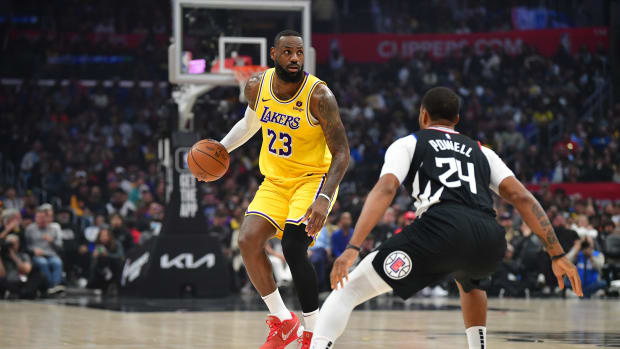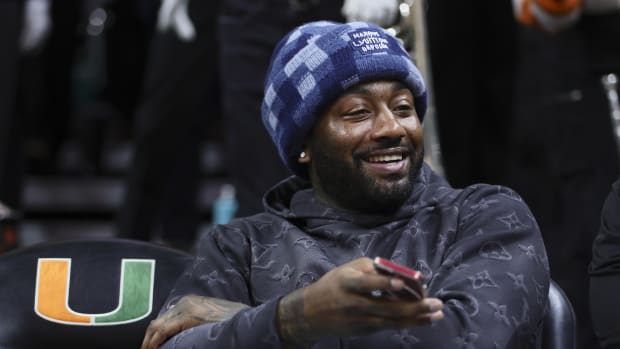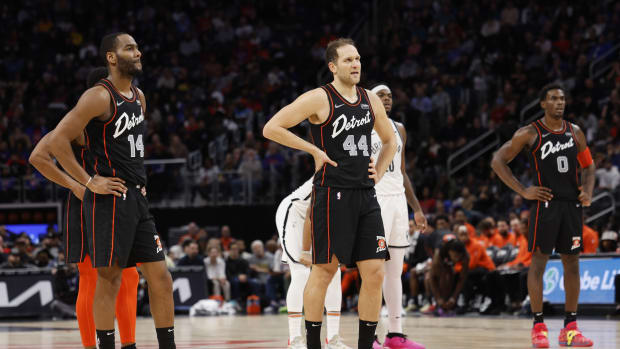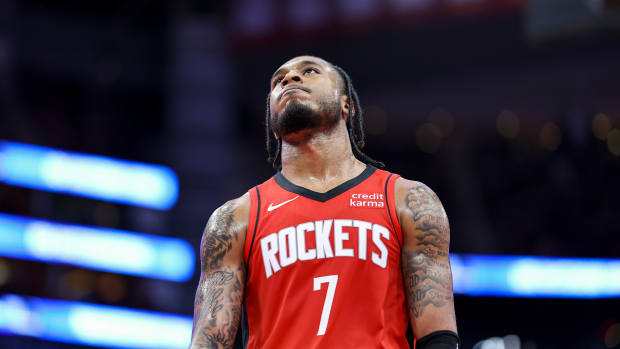The End of Ernie Grunfeld Won't Solve Every Wizards Problem
A friend of mine once said that Ernie Grunfeld has had the career of a Supreme Court Justice. It didn’t matter what decisions he made, whether they were successful, or how angry his critics became. Grunfeld was great at saving money and saving face, and the combination of those skills led to an appointment with the Wizards that felt like a lifetime. Among chief executives around the NBA, only Pat Riley, R.C. Buford, Donnie Nelson, and Danny Ainge were employed longer. Each of those guys won titles along the way. In Washington D.C., the Wizards once made it to the seventh game in the second round, and I'm pretty sure Game 6 against the Celtics is the closest an entire generation of Wizards fans have ever come to a championship. (In fairness, this was awesome.)
Grunfeld wasn't terrible. His teams were generally decent, and while his decisions often left the Wizards shorthanded in subsequent seasons, he was good at finding short-term solutions to keep things afloat. Also, underwhelming or not, his tenure was significantly more successful than the 20 years that came before him.
The problem with Grunfeld was that his shortcomings were obvious, and they were ignored for so long that his continued employment eventually became its own metaphor for an organization that has come to be defined by lowered expectations and an ongoing failure of imagination. All of that is why, when Grunfeld was finally fired Tuesday, fans lost their minds. I live in D.C. and I've been a Wizards fan all my life, and here are various text messages I received in the immediate aftermath of Tuesday's news:
• "OH MY GOD"
• "There is a god!"
• "Finallllllllllllly"
• "[Wizard Party .GIF]"
• "He's really gone???"
• "New dawn, new day!"
The rest of this season has been a waking nightmare. It's kind of unbelievable. In the first year before a four-year, $170 million contract extension kicks in, John Wall elected to undergo season-ending surgery in December and then, in February, he slipped at home and suffered an injury that will cost him all of next season, too. All told, what happened to Wall this winter will probably limit his impact for the rest of his career, and honestly, I'm still not ready to think critically about exactly how depressing these developments were. It was a sequence so Wizards that it's actually too Wizards to even contemplate.
Elsewhere: Dwight Howard introduced himself with a poem about his NBA career, showed up to the first day of training camp with an injured butt, and played nine games all season; there were several fights in one early practice and at one point a star yelled at Grunfeld and told him that he'd been "dealing with this s**t for eight years"; the team traded the former No. 3 pick, Otto Porter Jr., for a second-round pick and two expiring contracts; they were involved in a three-team trade in which all three teams were unsure what "Brooks" was involved in the negotiations; 23-year-old Kelly Oubre became 33-year-old Trevor Ariza for some reason; the team began the year 2-9 and the season was over by Martin Luther King Jr. Day; news leaked that beloved broadcaster Steve Buckhantz may not have his contract renewed after this season; Bradley Beal has played so well that he may command a supermax contract the team can't and shouldn’t pay; Scott Brooks continues to play Beal more than any player in the entire league, and when asked for an explanation, he said, "There’s a lot other hard things in the world to get through other than playing 40 minutes of basketball.”
For years NBA writers and Washingtonians have joked about what it might take to get Ernie fired, and this season's answer was so much more incredible and demoralizing than anyone could have imagined.
Looking ahead, the solutions for this team will come via the draft, heightened investments in player development and scouting, new leadership that can hold players accountable and help them grow, and a willingness to use the inevitable frustration of next few years—likely lost because of John Wall's injuries and contract—as an opportunity to aggressively reinvent who the team is and where everyone involved is trying to go. Instead of chasing veterans like Trevor Ariza to go win 43 games, clear cap space, take chances on high upside young guys, take on bad contracts in exchange for picks, and start dreaming bigger. The Wizards can be one of the best teams in the NBA, but not if the internal standards of success remain the same.
It's embarrassing that it took this long for this team to try something new. Without going into granular detail about mistakes that have been made, Grunfeld red flags have long been clear to anyone paying attention. He should have been fired five or six years ago—after 10 years on the job!—back when this team was still being assembled and Grunfeld had landed in the top 10 of the draft four seasons in a row.
At the moment, as much as this week's news should be encouraging in D.C., I'm a little wary of celebrating. You could just as easily argue that reviewing Grunfeld's track record should only make Wizards fans more alarmed at how long this era lasted and how many opportunities were missed along the way. That's before you consider the rationale of the firing itself. "We did not meet our stated goals of qualifying for the playoffs this season and, despite playing with injuries to several key players, we have a culture of accountability and a responsibility of managing to positive outcomes,” Ted Leonsis said in a team statement Tuesday.
Would Grunfeld still be emplyoed if the Wizards were a seventh seed headed toward a respectable six-game loss against the Raptors? And if there's a "culture of accountability" now, then where was that accountability in all the years when the current nucleus was underachieving and lacked any realistic path to contending for a title?
It's the past decade that's been disappointing, not just past the season. At every turn during the Wall era, this franchise hase been half as clever as the competition and nowhere near as aggressive about chasing a championship. Take the summer after that seven game Celtics series. Boston, the team that actually won the series, parted ways with 75% of its 2017 roster—including trading Isaiah Thomas, because Danny Ainge knew the team wouldn't win a title if Boston paid him what he was going to demand in free agency. The Wizards, the team that lost that series, rewarded John Wall with a massive extension, misread Otto Porter's restricted free agency market before paying him anyway, and brought back essentially the same team. Boston came back and won 55 games last season; Washington won 43.
Comparing the progress of the Celtics and the Wizards may seems unfair. Boston had better assets and Washington's had some horrible luck along the way. But I wonder: if Isaiah Thomas played for the Wizards in 2017, is there any way Washington would have had the guts and foresight to ignore his local popularity and trade him before his value declined? If John Wall played for the Celtics through those years, is there any way Boston ignores his injury history and maturity questions and decides to offer him $40 million per year?
To be clear, Wall's red flags were easy to miss. Everyone killed the Celtics for trading Isaiah. None of these answers were obvious at the time. That's not the point. What's important is that the NBA favors teams that are proactive and honest with themselves about what they have, what they're trying to achieve, and the most realistic path to getting there.
Losing teams, on the other hand, are the ones that decide to keep Otto Porter until the entire league sees they've made an abrupt decision to get beneath the luxury tax. That's how the No. 3 pick in the draft becomes a second round pick and two expiring contracts. Losing teams are the ones who overreact to three weeks in the playoffs that tell a different story than six months of the regular season. That's how you end up extending Randy Wittman during the same summer the Warriors fire Mark Jackson and hire Steve Kerr. Losing teams are the ones who ignore league-wide whispers that Kevin Durant isn't interested in D.C. and blindly chase him anyway, never pivoting to a realistic backup plan. That's how Scott Brooks and Ian Manhimi arrive in Washington making a combined $99 million.
The Wizards have been a losing team for years, and that was true even when the players were good enough to win anyway. The entire organization has been defined by half-baked logic and shortsighted incentives. If anything’s going to change going forward, the next phase should begin with a recognition that making the most important NBA decisions is incredibly difficult. Correct answers are not always clear, or satisfying, or easy to sell—but that doesn't mean a team should remain passive and content until a lack of alternatives makes every choice obvious.
Grunfeld never learned that lesson. Given that it took 16 years and a season from hell to arrive at the end of this era, I'm still not positive Leonsis has, either.



































